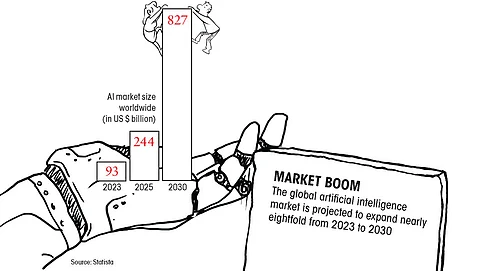

Artificial intelligence, or AI, now features in nearly every technology we use, from automated teller machines to food delivery platforms to stock trading algorithms. In 2024, Nobel Prizes for Physics and Chemistry went to research that paved the way for AI advancements. Goldman Sachs Research estimates AI investment could reach $200 billion globally by 2025.
But AI poses several concerns, since it exhibits an ability to “lie” and “deceive”, resulting in the risk of fraud, election tampering or loss of control of AI systems. More than 30 AI lawsuits were filed in 2024, according to data from George Washington University, US. A key issue that emerged is the usage of copyrighted materials for training AI.
The UN Environment Programme also warns of AI-based weapons being deployed in Ukraine and West Asia conflicts. The UN General Assembly has adopted the first global resolution on AI, recognising its potential in achieving sustainable development goals but asking countries to safeguard human rights in its design, development and use.
Developments that will define the AI sector in 2025:
Nations may soon begin discussions on the need for a treaty on AI. But Jonathan Askin, professor of clinical law, Brooklyn Law Incubator and Policy Clinic, US, writes in the National Law Review that he expects multiple failed attempts for international treaties to develop an international framework to govern use and misuse of AI systems.
With Donald Trump taking charge in the US, the fate of the “Executive Order on the Safe, Secure and Trustworthy Development and Use of Artificial Intelligence” put forth by the Joseph Biden administration hangs in the balance. The order establishes new standards for AI safety and security, protects Americans’ privacy, advances equity and civil rights, stands up for consumers and workers and promotes innovation and competition. It builds on previous action while calling for international allies to support voluntary commitments similar to those that US companies have made. Some believe that Trump could remove the guardrails.
The number of AI agents, which autonomously perform tasks such as handling routine customer enquiries or turning human-provided design ideas into prototypes, could double the workforce, according to PwC, a network of firms providing professional services. Technology firm Deloitte Global’s “2025 Predictions Report” projects that 25 per cent of enterprises using Generative AI might deploy AI agents in 2025, growing to 50 per cent by 2027.
Global electricity use by data centres — the backbone of AI and modern computing — was estimated to be more than 380 terawatt hours (TWh) in 2023, or approximately 1.4 per cent of global electricity consumption, according to Deloitte. This is projected to nearly triple to around 1,000 TWh by 2030, or 3 per cent of worldwide power use. Over the next two years, AI markets could double electricity consumption.
This was first published in the 1-15 January, 2025 Print edition of Down To Earth